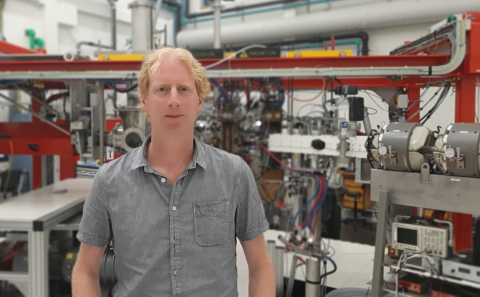Hans van Eck is heading DIFFER's new Facilities & Instrumentation department. The department unites the research facilities that were partly under Fusion Energy and partly under Solar Fuels. A conversation about synergy, specialists, and guest researchers.
Short biografy of Hans van Eck

Hans van Eck graduated in Applied Physics from the Fontys University of Applied Sciences in Eindhoven in 1997. Subsequently, he worked for three years as a research technician on superconductors at the University of Twente. After that, he deepened his knowledge of strong magnets for almost a year at the National High Magnetic Field Laboratory in the United States. In late 2000, he returned to the University of Twente to work on the combination of magnets and superconductors. Since 2004, Van Eck has been based at DIFFER. First as a specialist for Magnum-PSI, later as group leader for Magnum-PSI, Upgraded Pilot-PSI, nano-PSI, and the Ion Beam Facility. In 2013, while working at DIFFER, he received his PhD from Eindhoven University of Technology on the design of Magnum-PSI's superconducting magnet and vacuum system. Since July 2023, Van Eck has been heading the new Facilities & Instrumentation department. That department manages all of DIFFER's major research facilities and instruments. In his spare time, Van Eck enjoys hiking and mountain biking.
You recently became head of the new Facilities & Instrumentation department. Why is it beneficial to have one department with all research facilities combined?
"Let me start with an example. Until recently, a technician was attached to only one instrument, for example, just to Magnum-PSI. That worked quite well, because it makes you a super-specialist. But it also makes you vulnerable. What if this specialist gets ill? Or what if one moment it is relatively quiet at Magnum-PSI, but very busy at another instrument? I want to link technicians together, having a specialist who shares his knowledge with another technician. And I want to spread the workload."
You're also on the management team now, are you noticing any benefits from that?
"Yes, sure. Previously, the management team was composed of the director along with the heads of Fusion Energy and Solar Fuels plus the institute manager. Now I'm also part of it. It's no longer about us, but with us."
Fine, but can you illustrate the benefits?
"For example, we intend to build several new facilities at DIFFER. In the management team, I said that that's great, but that we have to phase it in. We have our workshop, drawing room, software specialists, and electronics experts. You can't have them build everything at once. It is often one after the other, and sometimes in tandem. You have to take that into account."
And did the management team accept that?
"Yes."
I would imagine guest researchers are overwhelmed by the application form on the DIFFER website?
"That form is usually not the first step. Often it starts with an email or phone call, with a request to examine material for Magnum-PSI, for example. After that, we go over the requirements in detail in a video meeting. And only at that stage does the form come. This step-by-step procedure really helps."
And how will it proceed after the video meeting?
"The guest researcher prepares a presentation in a template provided by us. At least two weeks before the experiment, the researcher gives this presentation to our group. Our technicians and operators are also present, and that's when we connect the dots. On the day of the experiment itself, our operators run the equipment. For example, they know exactly which handles and switches to move to achieve a certain temperature at the target."
Can anyone visit DIFFER's facilities to conduct research?
"Well, we have three categories. The first category consists of our own researchers and researchers funded by EUROfusion. That's the European collaboration in nuclear fusion research. They can use our facilities for free."
What about the second category?
"For that, the research has to fit to some extent into the DIFFER strategy. So it must have to do with materials, processes and, systems for the energy provision of the future. In addition, the results of the research must be published open access with us as co-authors. For this second category, research at DIFFER is also free or on an expense basis."
How about the third category?
"That's about research that doesn't fit our strategy. For example, if a computer chip machine maker wants to test materials, it can be done at DIFFER, but it will be at a commercial rate."
DIFFER's strategy states that it is going to open up more to the outside world. How do you envision that?
"We are going to more actively point the research field to our facilities. In this regard, it helps that many of our group leaders are also lecturers at universities. However, that still leaves the fields in which we are less involved. For that, we should go to meetings and conferences."
Finally, do you have any advice for guest researchers?
"Yes, of course. If you are interested in our facilities, just get in touch. Call or email me or a colleague. Our contact information is below every web page that is about our facilities."
Dutch original text
Author: David Redeker
Go to the News page.